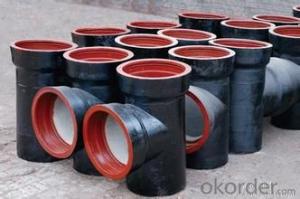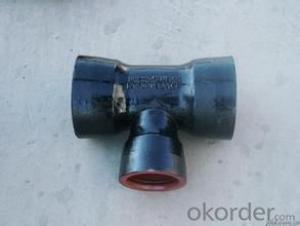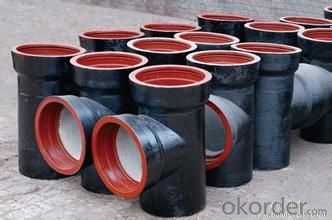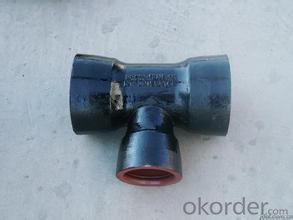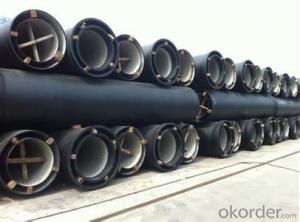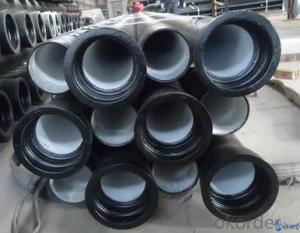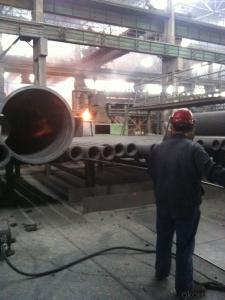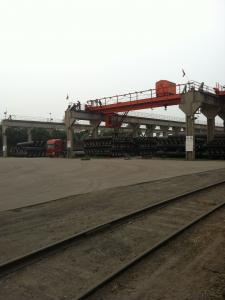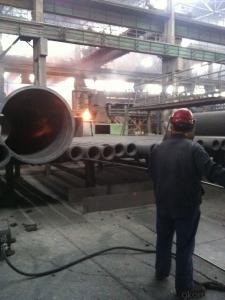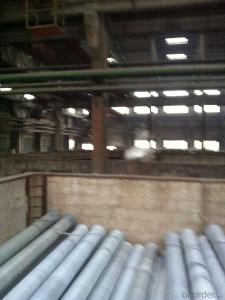DUCTILE IRON PIPE AND PIPE FITTINGS K9 CLASS DN100
- Loading Port:
- Tianjin
- Payment Terms:
- TT OR LC
- Min Order Qty:
- 20 pc
- Supply Capability:
- 3000 pc/month
OKorder Service Pledge
OKorder Financial Service
You Might Also Like
Material : Ductile Cast Iron
Size Range : DN 80mm to DN 2000mm
Unit Effective Length : 6m or 5.7m
Manufacture Standard: ISO 2531:1998/ EN 545:2006/EN 598:2007
Annual capacity : 200,000 tons
Coating Exterior: Zinc 130g/m2 according to ISO 8179-1 and bitumen coating 70 microns.
Cement Interior: Portland Cement/ High Alumina Cement/ Sulphate Resisting Cement Lining according to ISO 4179
Special requirements on external coating and internal lining can be applied
We also provide accessories such as SBR/EPDM rubber gaskets, lubricant paste, pipe caps, PE sleeves, etc.
Additional Parts:
Each pipe is strictly inspected according to related standard to ensure permanently high performance.
Easy Installation at site and service free for life
Long Service Lifespan
Quotation will arrive you within 24hours once we get your inquiry.
We guarantee offering you a competitive price.
A copy of original inspection reports of pipes will be offered after shipment.
Photos of loading process will be sent to the customer after shipment effect.
We will follow-up the delivery progress after shipment effect and update to the customer on weekly basis.
- Q: Are ductile iron pipes suitable for high-temperature applications?
- No, ductile iron pipes are not typically suitable for high-temperature applications as they have a lower melting point compared to other materials like steel.
- Q: What is the minimum pipe diameter of cast iron pipe?
- Cast iron pipe: cast pipe made of cast iron. Cast iron pipes are used for water supply, drainage and gas transmission lines. They include cast iron pipes and pipe fittings. Labor intensity is small.
- Q: Method for cutting cast iron pipe
- I don't know the diameter and length of the cast iron tube. The small diameter can be made of a huge bed. The short one can also be lathe. The lathe is very flat
- Q: Comparison of ductile iron pipe and spiral steel pipe
- Ball milling cast iron pipe: corrosion resistance, high compressive strength, cheap, non pressure, socket connection.
- Q: Can ductile iron pipes be used for conveying gases?
- Yes, ductile iron pipes can be used for conveying gases. Ductile iron has excellent mechanical properties and is resistant to corrosion, making it a suitable material for transporting various types of gases. Additionally, ductile iron pipes are known for their strength and durability, making them a reliable choice for gas transmission systems.
- Q: Can ductile iron pipes be used for underground mining applications?
- Yes, ductile iron pipes can be used for underground mining applications. Ductile iron is known for its strength, durability, and resistance to corrosion, making it suitable for underground mining environments where it may be exposed to harsh conditions and abrasive materials. Additionally, ductile iron pipes have excellent load-bearing capabilities, making them ideal for carrying and transporting materials in mining operations.
- Q: How to distinguish flexible and rigid interfaces between cast iron pipe joints
- Rigidity is a way of connection that has been eliminated. Sealing is achieved by pouring cement into the spigot
- Q: Can ductile iron pipes be used for underground chemical processing systems?
- No, ductile iron pipes are not suitable for underground chemical processing systems as they can corrode and react with certain chemicals, compromising the integrity of the system.
- Q: What is the content of silicon in silicon molybdenum ductile iron?
- Silicon molybdenum material, similar to the United States IDM5381, 5402 and other brands, engaged in automotive components (such as turbocharger parts), and other heat resistant parts have been exposed to high temperature
- Q: What is the expected pressure class for ductile iron pipes?
- The pressure class anticipated for ductile iron pipes may differ based on the particular use and project needs. In a general sense, ductile iron pipes are engineered to manage high-pressure situations and are typically offered in pressure classes spanning from 150 psi to 350 psi. These pressure classes signify the utmost operational pressure that the pipe can endure while preserving its structural soundness. To ascertain the suitable pressure class for ductile iron pipes in a specific scenario, it is crucial to refer to industry standards, guidelines, and project specifications.
Send your message to us
DUCTILE IRON PIPE AND PIPE FITTINGS K9 CLASS DN100
- Loading Port:
- Tianjin
- Payment Terms:
- TT OR LC
- Min Order Qty:
- 20 pc
- Supply Capability:
- 3000 pc/month
OKorder Service Pledge
OKorder Financial Service
Similar products
Hot products
Hot Searches
Related keywords
